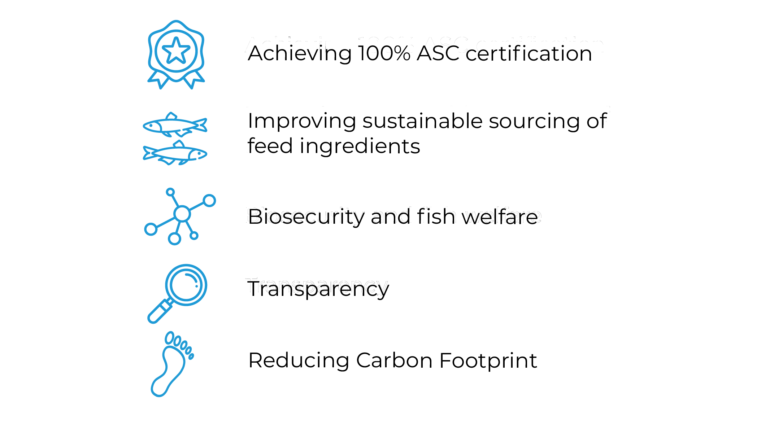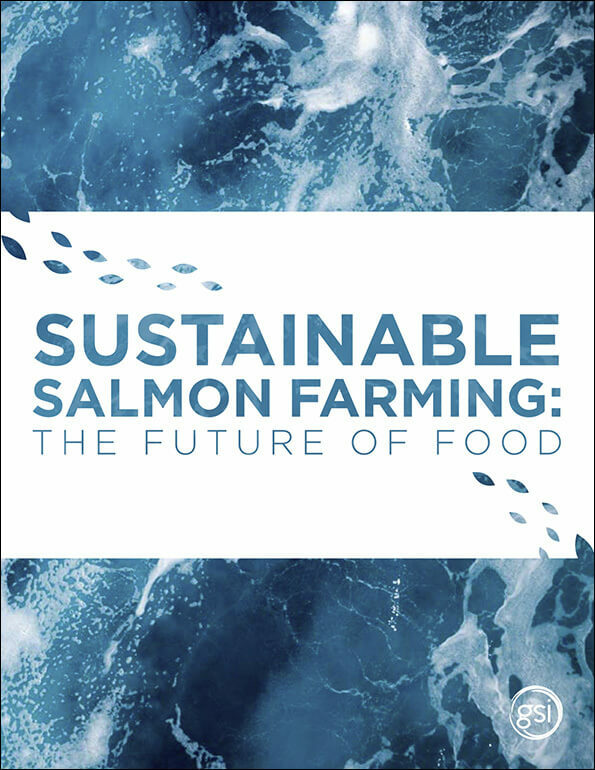If there is one thing everyone can agree upon, it is that significant change is needed in our food systems to ensure they can meet growing demand, conserve the world’s resources, and provide nutritious food. We believe that collaboration is the only way to drive this change and we are committed to working together to ensure responsible, sustainable food systems.
Aquaculture is one of fastest-growing food-producing sectors on the planet, and although farmed fish is widely recognized as a healthy, resource-efficient protein, it must be managed responsibly as the industry grows to ensure it remains a sustainable option.
Through collaborative efforts to improve sustainability performance, transparency and innovation, GSI members help ensure farm-raised salmon is one of the most eco-efficient animal-based proteins available, while maintaining salmon’s nutritional integrity and reducing pressure on the ocean’s resources.
GSI Model: Pre-competitive collaboration
Business, as usual, is no longer an option. Our food systems are under threat and need a drastic change. Working independently or on a smaller scale may address some challenges but it will not deliver significant change or address the challenges at the speed our food system requires.
Within the GSI, we have identified several key areas where we believe we can have a greater impact by working together-at scale, and at a faster rate-than working individually.

"I fully support aquaculture, but it has to be done right. Just like every other industry is remaking itself in the 21st century, we need to change too."Alexandra Cousteau, Oceanographer
Our main objective is to produce healthy fish in healthy waters and as farmers of the sea, we share our waters, which is why we believe it makes sense for us to cooperate and work together on biosecurity management.
We know that as an industry, we are not perfect and we face challenges, but by collaborating, we can bring together the shared expertise and experiences we have to problem-solve and innovate to improve the salmon farming industry’s sustainability performance.
“The good news is that we can get change at speed and scale if we find out how to adopt a model of private sector-driven creative innovation, using pre-competitive collaboration and basing it on high ambition and transparency”Avrim Lazar, GSI Convenor
What do we mean by pre-competitive collaboration?
The GSI uses a model of pre-competitive collaboration to drive industry-wide change, at speed and scale, to support salmon farming’s contributions to healthy, sustainable diets and food systems.
In this webinar with Greenbiz we discuss what we mean by pre-competitive collaboration when it comes to sustainability improvements, and how we are putting it into practice to drive change.
This webinar will discuss a different approach – instead challenging us to view sustainability as a pre-competitive issue – resulting in much greater impact, in a shorter period of time.
Avrim Lazar, Convenor of the GSI, will discuss the reasons why this unconventional approach will increase the success factor for the Blue Revolution, and how other sectors could look to replicate this approach. In addition, Ricardo Garcia, CEO of Camanchaca and Einar Wathne, President of Aquaculture, Cargill Nutrition, will share their experiences of incorporating this model into their daily business practices. The session will cover the key attributes of a pre-competitive model, the opportunities and challenges faced, and both the environmental and economic results the first case-study of its kind is showing.







Follow us on social media and sign up for the newsletter
X
Threads
LinkedIn
Instagram
YouTube
Newsletter